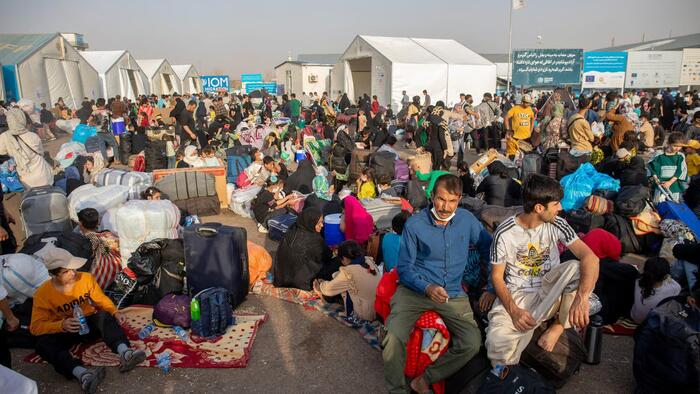In a significant and controversial move, Iran has initiated a sweeping program of mass deportations targeting millions of Afghan migrants, a policy it asserts is vital for its national security amidst heightened regional tensions. This drastic measure has rapidly drawn the critical attention of the United Nations and numerous humanitarian non-governmental organizations, who express deep concerns over the scale and implications of such a widespread displacement.
The intensity of these deportations is striking, with estimates from Iranian Interior Minister Eskandar Momeni indicating that nearly one million Afghan migrants have been forcibly returned to Afghanistan within the past month alone. This figure represents approximately half of the two million Afghans reportedly residing in Iran, underscoring the vast scope of the operation. Iran’s government spokeswoman, Fatemeh Mohajerani, affirmed the nation’s stance at the program’s outset, stating, “We’ve always striven to be good hosts, but national security is a priority.”
The primary justification offered by Iranian authorities for these extensive deportations stems from a series of detrimental intelligence leaks and acts of sabotage allegedly occurring within Iran during its recent conflicts with Israel. Iranian officials claim to have apprehended several Afghan refugees purportedly involved in sensitive operations, including the transportation and piloting of drones, the illicit gathering of classified intelligence, and the planting of explosive devices. A core assertion from Tehran is that foreign adversaries, particularly Israelis, find it easier to bribe and manipulate migrants for their clandestine activities.
One high-profile case widely publicized by Iranian authorities involved the arrest of an Afghan university student in the city of Rey. He was accused of possessing sensitive material related to bomb-making, drone mechanics, and surveillance operations, and of maintaining direct links to the Mossad. State television has also aired reports featuring arrested Afghan citizens “confessing” to their roles as Israeli agents. A notable broadcast on June 26 detailed the questioning of several suspects, predominantly Afghans, who were accused of conspiring to bomb a power station situated in southeast Tehran.
While the mass deportations could arguably serve as a means to deflect blame for Iran’s own intelligence shortcomings onto a convenient scapegoat, it is also acknowledged that migrant populations have historically been vulnerable to manipulation and recruitment by foreign adversaries. Iran’s cautious approach, from this perspective, aligns with a logical response to perceived threats, as open borders have long been exploited by intelligence agencies to embed “sleeper agents” within nations they intend to target or engage in conflict. This concern is not unique, as evidenced by recent reports of Iranians apprehended attempting to cross the U.S. border, some with alleged national security connections.
The Taliban government in Afghanistan has publicly urged Iran to halt the rapid exodus, advocating instead for a more gradual and orderly repatriation process. Afghan officials emphasize the critical importance of respecting the dignity of returning migrants. However, there are grave concerns that Afghanistan’s already fragile economy could be severely crippled by the sudden influx of over a million refugees within such a short timeframe, especially given the Taliban’s limited capacity for providing humanitarian support and aid.
Further complicating the humanitarian situation, Afghanistan continues to impose stringent restrictions on foreign aid organizations operating within its borders. The United Nations has additionally leveled serious accusations against the Taliban, citing “serious abuses” perpetrated against returning migrants. These alleged violations include cases of torture, mistreatment, and arbitrary arrest and detention, particularly targeting women, media workers, civil society members, and individuals associated with the former government that collapsed in 2021.
The escalating trend of Iran’s deportations, which have become increasingly frequent since 2023, is not solely attributed to national security concerns. The Iranian government has also cited significant economic strain as a contributing factor. Like any sovereign nation, Iran maintains that it is not solely responsible for bearing the full economic, cultural, and strategic risks associated with large-scale, uncontrolled immigration, signaling a firm stance on its border policies.






Leave a Reply